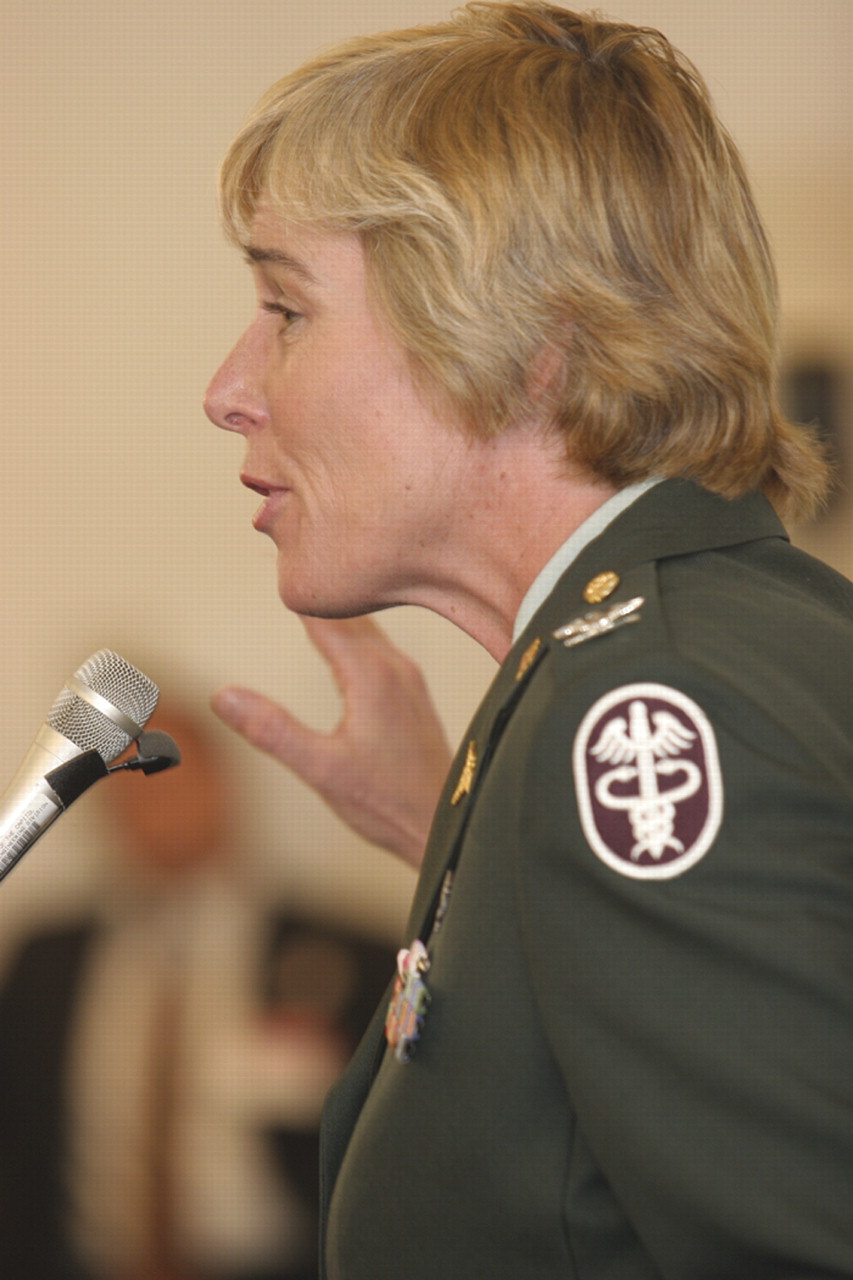Veterans of the conflicts in Iraq and Afghanistan may well see civilian psychiatrists in the United States for mental health care even as the Pentagon advances services closer to the battlefield and the Department of Veterans Affairs (VA) gears up for treating returning soldiers. Psychiatric care may be complicated, however, by the nature of the mental stresses and physical injuries experienced by men and women serving in combat zones, according to several experts.
“We've tried to put many lessons from other conflicts to use,” said Col. E. Cameron Ritchie, M.C., a psychiatry consultant to the U.S. Army surgeon general, in an interview. “Initial treatment—which may involve rest, relaxation, and hot meals along with counseling—takes place as close to the battlefield as possible so that troops can return to service quickly.”
Troops on active duty are covered by the military health care system, and many discharged soldiers have access to the VA system. However, unlike during the Vietnam War, 40 percent of the troops in Iraq and Afghanistan belong to the National Guard or the reserves. They have access to VA hospitals for almost any health issues related to their active service for two years after discharge. After that period, they must demonstrate a service connection for their complaint or meet low-income standards, said VA psychiatrist Mark Shellhorse, M.D., in an interview. Shellhorse is acting deputy officer for mental health for patient care services at the VA, based in Durham, N.C.
About 394,000 U.S. troops serving in the two current theaters of war have completed active-duty enlistments. A study by Col. Charles Hoge, M.C., and colleagues published in the July 1, 2004, issue of the New England Journal of Medicine (NEJM), found that about 16 percent of the troops who served in Iraq and 11 percent of those who served in Afghanistan met screening criteria for major depression, generalized anxiety, or posttraumatic stress disorder (PTSD) three or four months after their return. Troops serving in ground units of the Army or Marine Corps were 3.7 times more likely to have PTSD than members of the Navy or Air Force, according to a VA study in the March 31 NEJM. The rate of PTSD in enlisted personnel was twice that of officers.
After soldiers complete their service in Iraq or Afghanistan, many head back to civilian jobs or enroll in universities, where they are likely to encounter civilian psychiatrists, said Ritchie.
“[Civilian psychiatrists] are not likely to see a stereotypic soldier—either a young guy with short hair or a chronically homeless Vietnam vet,” she said. Veterans of the current conflicts have a wide range of ages and occupations, and 15 percent are women.
Civilian psychiatrists may also occasionally see active duty soldiers home on leave, brought to an emergency room by mothers or spouses concerned about their loved one's behavior or suicidal ideation, she said. Such soldiers should be referred to the military's medical system for follow-up care, she said.
In less-acute settings, asking a new patient whether he or she is a veteran may be the simplest way of screening and initiating a discussion of the vet's experiences. Risk factors for psychiatric sequelae include both the horrors of war and comorbid disorders, said Ritchie. They may have seen dead children or mutilated bodies, or were unable to help their comrades while under attack. Too often, such mental trauma is accompanied by physical injury in patterns that differ from those of previous wars.
“Because of protective gear that soldiers wear, they're more likely to survive when wounded than in past conflicts, so consultation-liaison service has become very important, especially to those with injuries to limbs, which are not protected by body armor,” said Robert J. Ursano, M.D., a professor of psychiatry and neuroscience and chair of the department of psychiatry at the Uniformed Services University of the Health Sciences (USUHS) in Bethesda, Md. “PTSD accompanying an injury is an important component of diagnosis.”
The effects of placing in-theater mental health services nearer to the front are not yet clear, said Ursano. However, wounded soldiers are seen for psychiatric evaluation at every stage of medical evacuation: close to the battlefield, in forward field hospitals, at Landstuhl in Germany, and at Walter Reed Medical Center in Washington, D.C.
“Screening programs that include mental health are in place to get them to the services they need,” said Ursano. “The mental health questions are new. You can debate how effective they are, but what's different is that it's happening, and that is a major step forward.”
Most importantly, given the frequency of roadside bombs, clinicians should also ask about the possibility of head injury. At least one-fifth of U.S. casualties in Iraq and Afghanistan had injuries to the head, neck, or face. The proportion may be even higher, since many cases of closed brain injury are not diagnosed immediately.
“Head trauma may be the signature wound of this war,” said Ritchie.
Traumatic brain injury can affect several areas of brain function, wrote Susan Okie, M.D., in the May 19 New England Journal of Medicine. Symptoms may include headaches; sleep disturbances; sensitivity to light or noise; disturbances in attention, memory, or language; or mood changes, depression, anxiety, impulsiveness, emotional outbursts, or inappropriate laughter.
Finally, clinicians encountering returning veterans should screen for risky behavior, said Ritchie. “They've been in the field for a year with no alcohol and have saved up their money. They come home, buy a motorcycle, and drive fast, so look for preventive strategies.”
Substance abuse is generally not a problem for troops in Iraq, but problems may arise when they get back to the United States, she said. “We don't have good numbers on how many are abusing alcohol after their return.”
Screening can provide an educational benefit for families as well as soldiers, to help them understand what has happened and to open the way for treatment. Symptoms can resolve, and medication can help these patients, she said.
The military medical services offer help for soldiers and their families before and during overseas deployment. Soldiers are now screened on their return and assessed for mental and physical health six months after their return. Soldiers who request help are offered six free confidential counseling sessions.
Nevertheless, some veterans have expressed concern about the availability of mental health services for returning troops.
“Mental illness could be the Agent Orange of this generation of veterans,” said Paul Rieckhoff, executive director and founder of Operation Truth, a nonpartisan advocacy organization for veterans of the Iraq and Afghanistan wars. Rieckhoff served as an Army 1st lieutenant in Baghdad in 2003 and 2004.
“There is a wave of mental illness coming, and the VA is unprepared to handle it,” he said in an interview. Besides the stresses of combat, Rieckhoff said that multiple tours of duty, repeatedly delayed returns to the United States, and the shifting rationales for the war weigh on the minds of those who serve.
Adequate services are available during enlistment and after discharge, counter the USUHS's Ursano and the VA's Shellhorse.
Removing barriers to care is important, said Ursano. Increasing access, having multiple modes of care, creating supportive communities, and educating families and commanders can all aid soldiers who need help. There may be subtle differences between the two departments, however.
The Department of Defense tries to encourage soldiers to discuss their psychological concerns in confidence, but many hesitate, concerned about effects on their careers, said the VA's Shellhorse. Although many vets still perceive mental illness as a failing and are reluctant to talk, it is a lesser issue among those already discharged and using the VA system.
“When they come to us, they're usually asking for help,” he said. “They've already crossed the barriers to care.”
The Pentagon sends names of service members to the VA as they are discharged. If a veteran comes to a VA hospital or clinic, a VA staffer will receive an automated reminder to ask the vet about depression, PTSD, substance abuse, and illnesses (like parasitic diseases) specific to the theater where he or she served.
The VA has set up several programs to cover care for veterans who live too far from VA facilities. Veterans can use a fee card to purchase services from local providers. In some areas, the VA may contract with local providers for care. The department is also expanding its telepsychiatry installations in its community-based outpatient clinics. There are 207 readjustment counseling centers across the country offering supportive counseling to help former soldiers and families.
These counseling centers represent a paradoxical source of care for women service members, said Rieckhoff. While the number of women soldiers is increasing, it is still hard to find female peer counselors, he said.
Civilian doctors should be aware of the need for care for any returning veteran, said Ursano. Primary care providers should ask vets about any traumatic events they may have experienced, and that includes war. They should also be able to diagnose PTSD, depression, and substance abuse.
Civilian psychiatrists can prepare themselves to assess or treat veterans of the current conflicts by reading the “Iraq War Clinician Guide” by the National Center for PTSD, a branch of the Department of Veterans Affairs, said Shellhorse.
“Courage to Care,” a series of fact sheets for veterans and their families, is posted at<www.usuhs.mil/psy/courage.html>. The “Iraq War Clinician Guide” is posted at<www.ncptsd.va.gov/war/guide/IraqGuide.pdf>.▪

